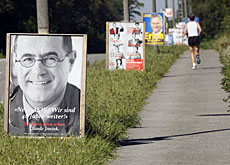
Election campaigners go on spending spree

Never before in Swiss history have political parties and individual candidates been spending so much money to win seats in Sunday's parliamentary elections, say experts.
The costs for the campaigns are estimated to be at least SFr50 million ($42.2 million) and concerns have been expressed about potential dangers for Switzerland’s democratic system.
It is virtually impossible to travel through the country these days without noticing the thousands of billboards for candidates in the run-up to the elections on October 21.
Equally, newspapers are chock-a-block with advertisements from potential parliamentarians promoting themselves and hoping to gain the attention of readers and voters.
There are no precise figures on the costs for the campaigns but it is widely believed that the ballot is the most expensively contested one ever.
Campaign adverts in newspapers and magazines alone have cost more than SFr20 million, around a third more than in the previous elections in 2003 according to Publicitas, a leading marketing and sales firm.
Budgets
Switzerland has no transparency laws on the financing of political parties. The groups do not benefit from government funding, but depend on donations and other support.
The rightwing Swiss People’s Party has run a high-profile campaign in the past months. Two out of five advertisements were placed by members of the party which officially has a SFr5 million budget for the elections.
Funding for the other three parties in government is much smaller. The centre-left Social Democrats have spent SFr1.2 million, while the two centre-right parties, the Radicals and the Christian Democrats, have earmarked SFr1.6 million and SFr1.5 million respectively.
The Greens are even more modest at SFr700,000, according to party officials. But experts say the figures are misleading, since cantonal chapters of the parties manage their own budgets and individual candidates often raise funds for their own campaigns.
A survey from 2001 found that the 120 cantonal parties had nearly SFr28 million at their disposal. The figure is very likely to have increased over the past six years, say experts.
Trading accusations
Party funding has also become an issue during the campaign. The Social Democrats published budget calculations for their main rivals, the People’s Party – who in turn discounted the figures as untrue.
They also rejected allegations that rich donors, including the controversial justice minister Christoph Blocher – a former billionaire businessman – are acting as sponsors for the party.
“More interesting than the dispute about figures is the fact that the costs of the campaign have become an issue,” says political scientist Oscar Mazzoleni.
Last month parliament rejected a proposal for more transparency over party funding.
Dangers
However, Tiziano Balmelli, an expert on constitutional law at Fribourg University, has warned that increasing campaign costs are a potential threat to democracy.
“The gap is growing bigger between those who have full coffers and the others [who do not]. There is also increasing pressure to raise funds. This undermines the democratic system,” he said.
Balmelli is sceptical about whether it is possible to put into practice a failsafe method of regulation. He points out scandals in Germany and the United States – two countries with strict rules on party financing.
Instead Balmelli is in favour of capping campaign funding. But he has little hope that such a measure will be accepted any time soon.
“Nobody wants to go and lobby for such a proposal,” he said.
swissinfo, based on an article in German by Gerhard Lob
Switzerland has no transparency laws on political party financing.
Political parties do not benefit from public funding, apart from small contributions to the leading parties in parliament.
The parties finance their campaigns with donations and other contributions, notably by companies and prominent party members. However, as a rule no figures are available.
A proposal for more transparency on the financing of election campaigns was rejected by the House of Representatives last month.
As part of Switzerland militia system, politicians work on a voluntary basis while supporting themselves through other jobs.

In compliance with the JTI standards
More: SWI swissinfo.ch certified by the Journalism Trust Initiative

























You can find an overview of ongoing debates with our journalists here . Please join us!
If you want to start a conversation about a topic raised in this article or want to report factual errors, email us at english@swissinfo.ch.